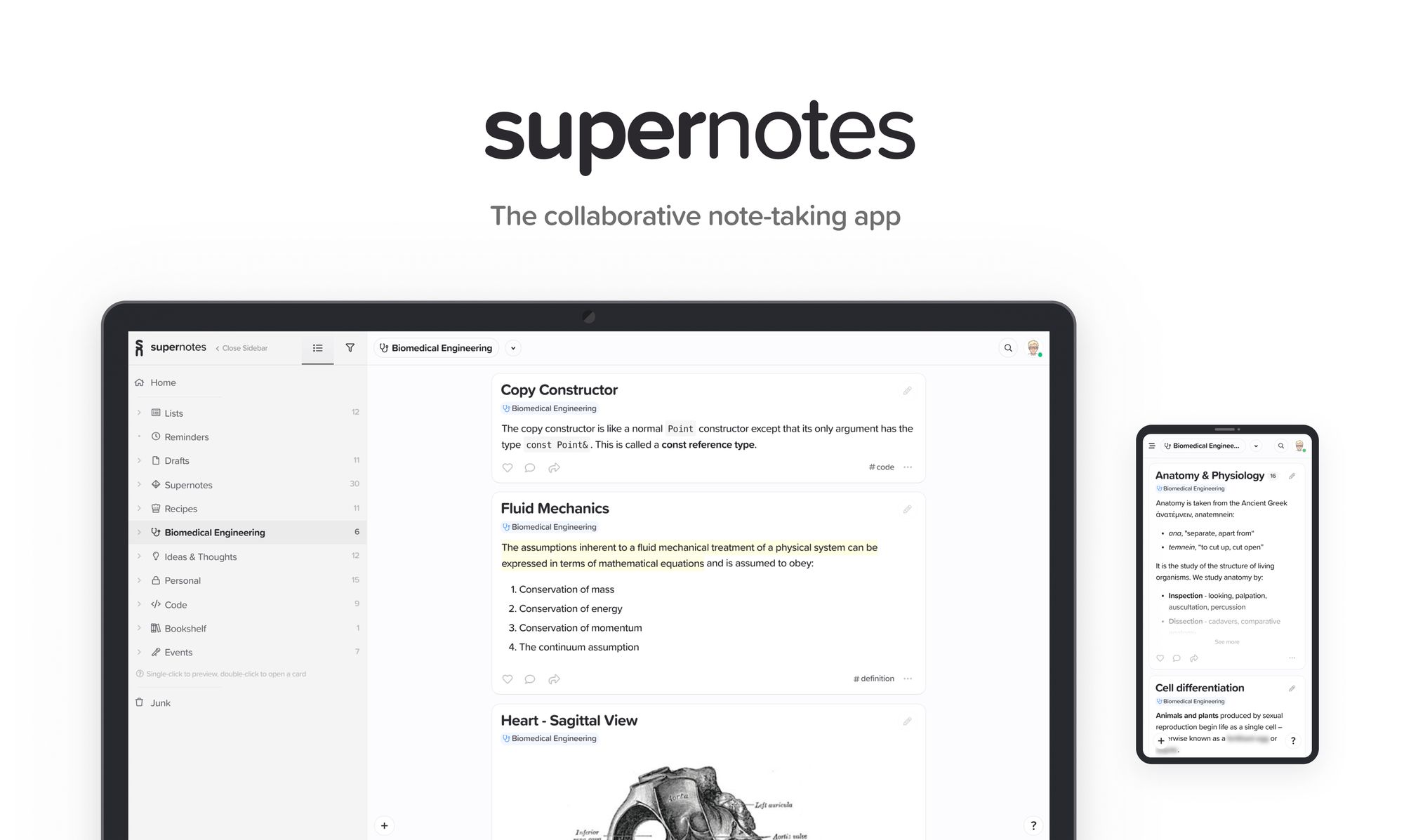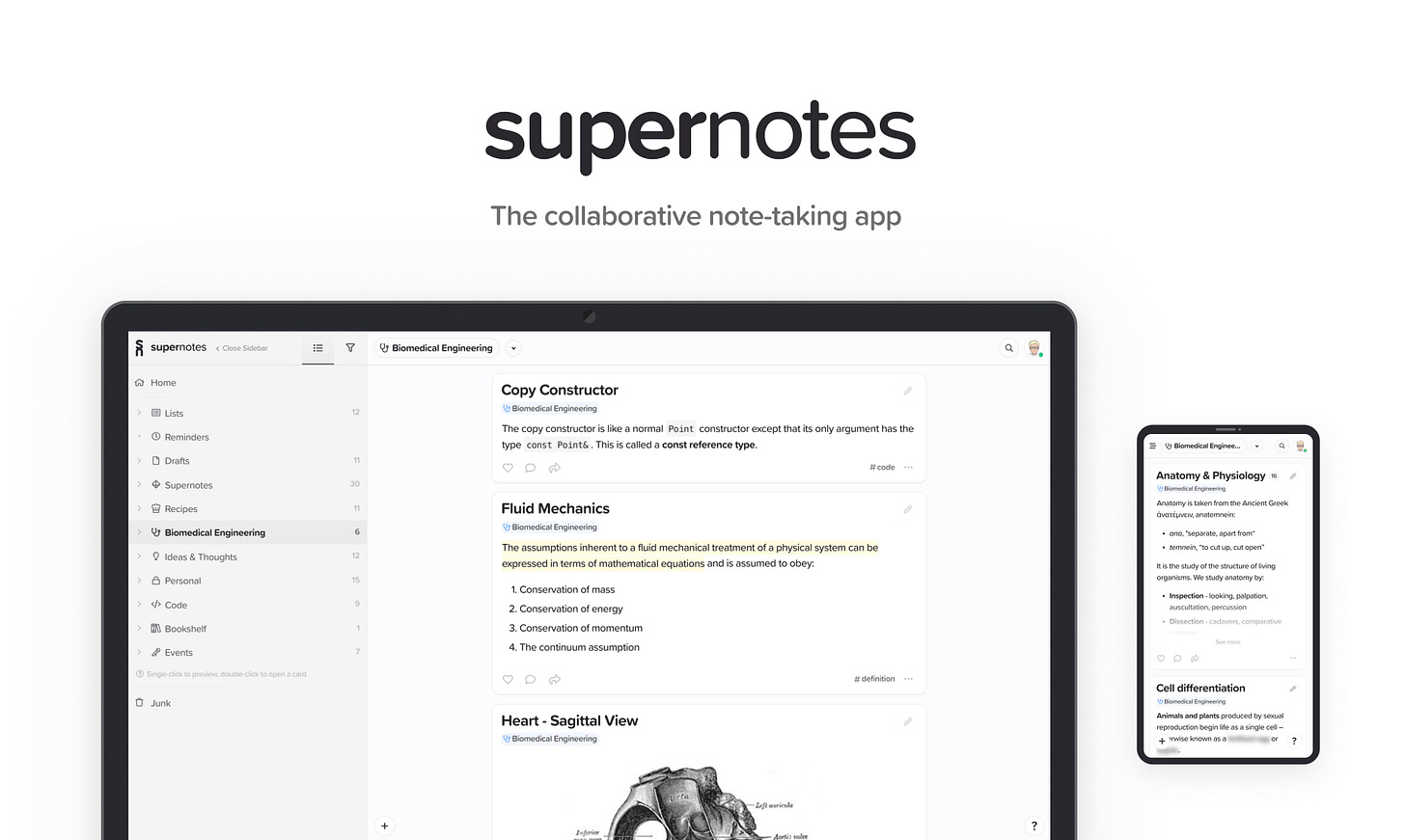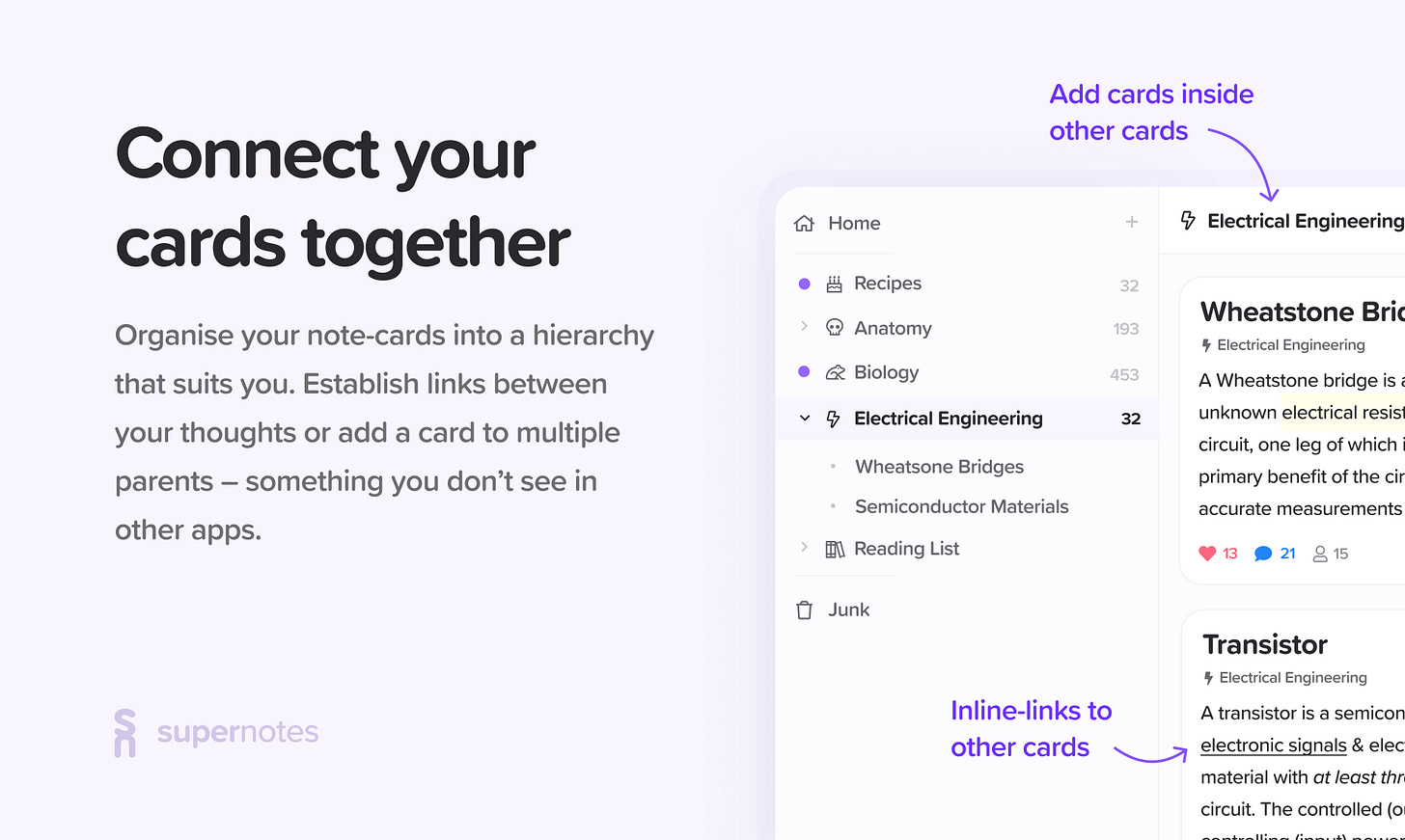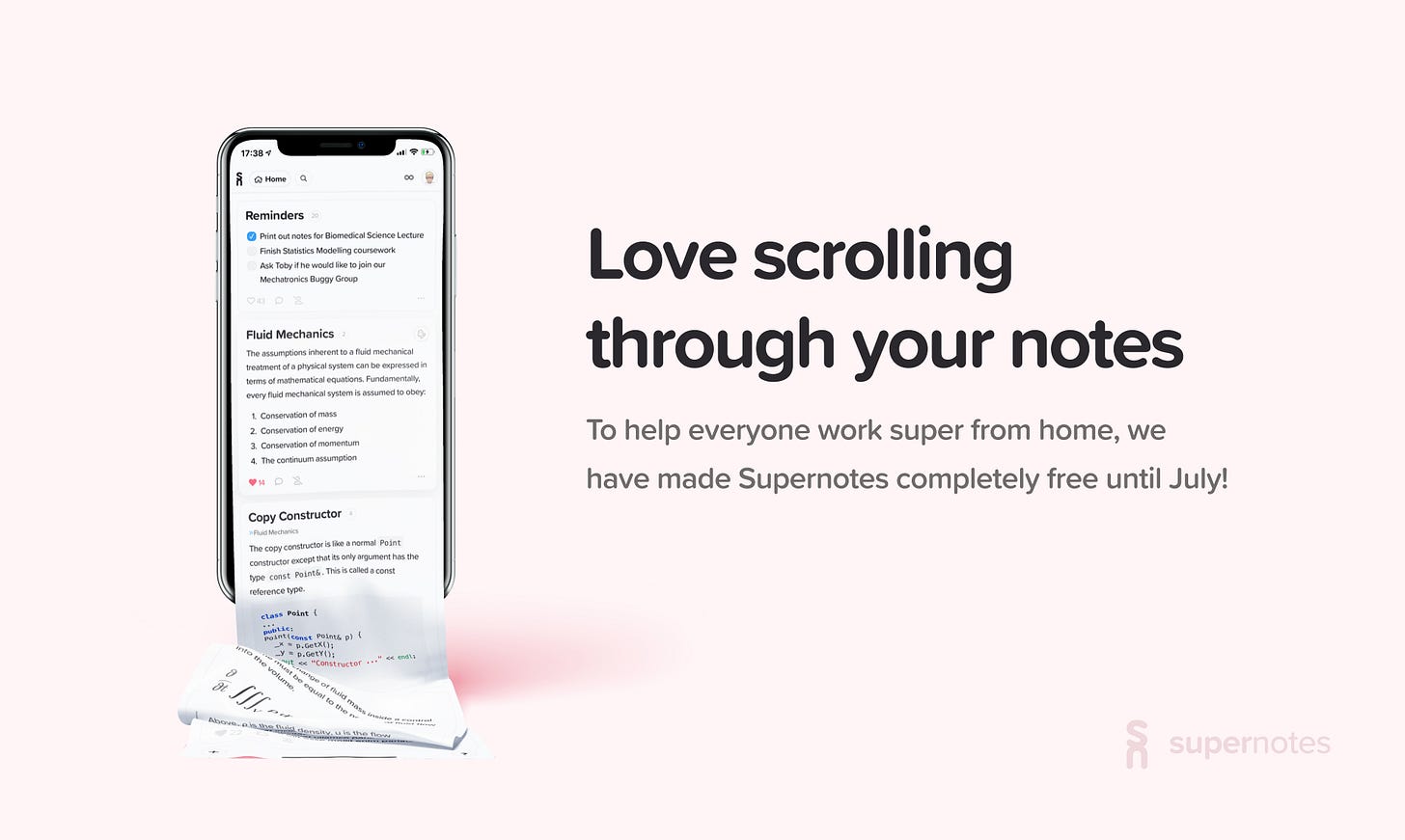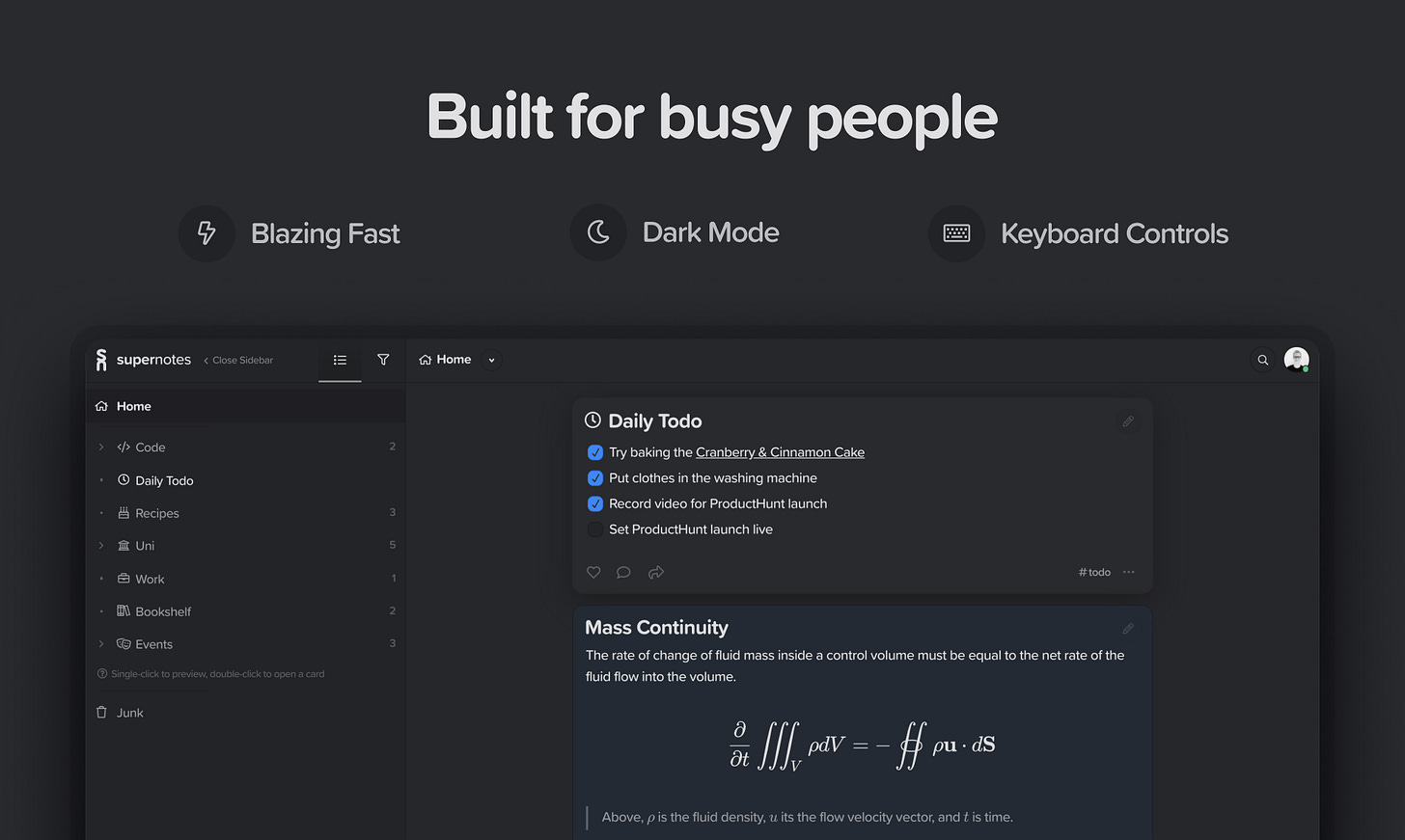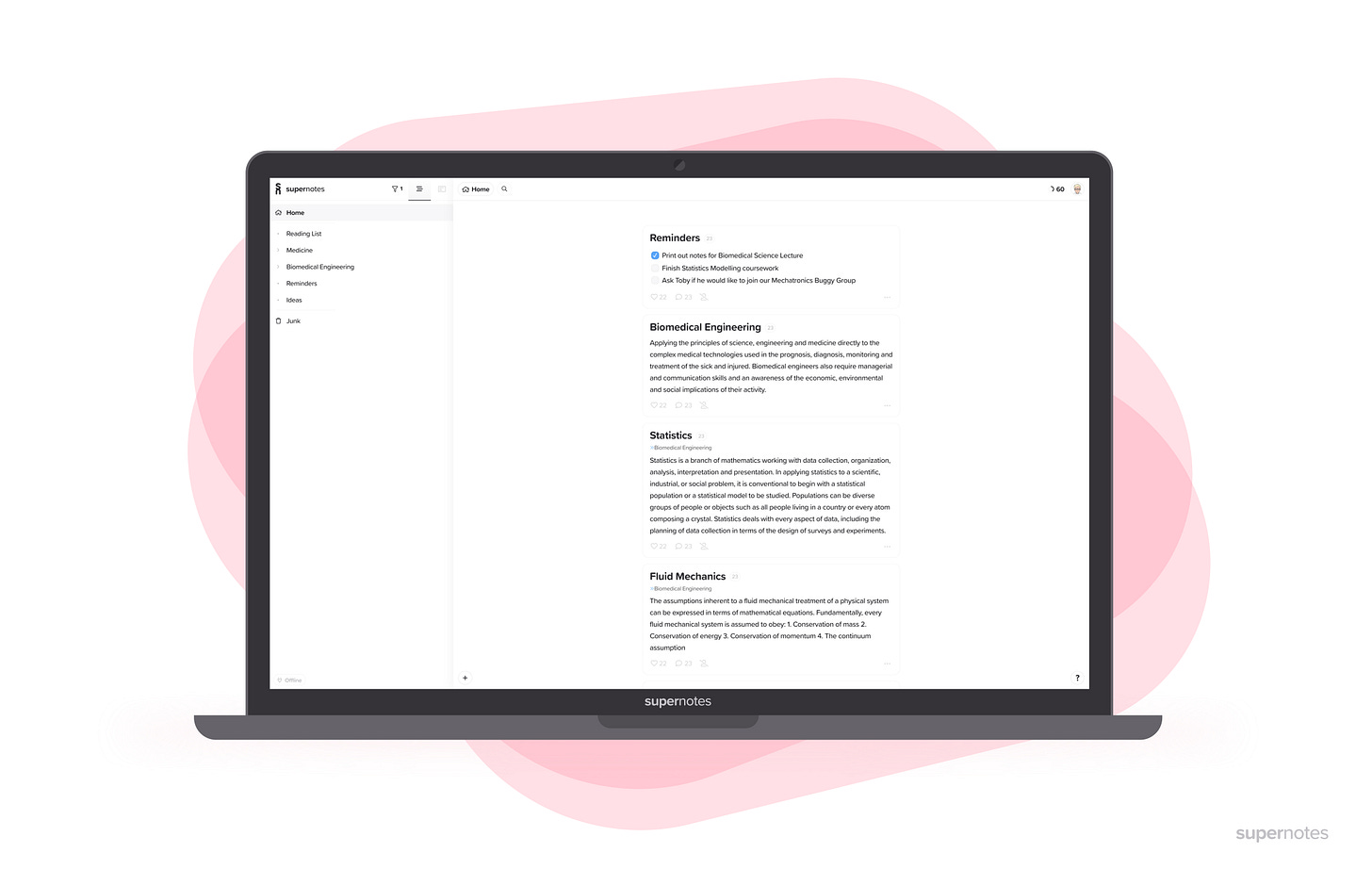|
You are reading Creativerly, the weekly digest about creativity and productivity-boosting tools and resources, combined with useful insights, articles, and findings from the fields of design and tech. The newsletter built for the creative community.
Hey and welcome to Creativerly's Interview with Tobias Whetton 👋The feedback I got from my subscribers after I published Creativerly's interviews with Noemi Stauffer and Jim Raptis was great. You really seemed to love this new content section. Therefore I am more than happy to present you another interview. In this new interview, I got to ask Tobias Whetton, Co-founder and CEO of Supernotes, a couple of questions about EdTech, the current productivity-tool-sector, how he overcomes a creative blockade, and a lot more. Supernotes is a productivity and note-taking tool with a new approach, focusing on creating a network of notes. Supernotes is super-fast, mobile-friendly, has a powerful editor, intuitive keyboard controls, and it takes care of lots of other things for you, so you can focus. My goal always is to get as much insights from my interview partners as possible. Therefore, if you have some specific questions in general you want to get answered by different creative minds, do not hesitate and send them my way, I will then try to include them in any upcoming interviews. Enjoy reading through this interview! If you have recommendations or feedback, drop me an email or a tweet. For now, enjoy the newsletter! 🥰
First of all, thank you for this opportunity. Please give us a quick introduction about yourself, what you do, and what you are working on.I'm Tobias, a designer, developer and engineer that lives in London. Since the last three years I have been building Supernotes with my co-founder Connor. Supernotes is quite different, and maybe slightly too ambitious. Our vision is to become the social network for your knowledge. A place where you can quickly jot down your ideas, thoughts and tasks and then share what you want in a piecemeal fashion with your friends, family and colleagues. When I take a break, I love playing board games, going for a run and rock climbing with my friends. We have put a lot of thought into Supernotes. When we started three years ago, we spent months researching productivity methods, gaining an in-depth understanding of the science behind knowledge retention before building anything. I still remember the day we came up with our unique note-card format. We were working late and Connor leaped out of his chair, "knowledge is like legos, let's build a new format around that". And that's what makes Supernotes unique, but instead of legos, we invented our note-cards. Each and every note-card are themselves taggable, nestable, linkable and shareable; each one being as important as the next. Just like legos you can piece them together to build your own interlinked knowledge database. Waving goodbye to those esoteric folder–file structures we have relied on for 100s of years which just aren't suited to how we think. We are trying to push the boundary on what's possible, having both bi-directional linking and a hierarchy; allowing cards to have more than one parent card. E.g. If you have a note-card on "Femurs", you might want that card to be a child of "Anatomy" and "Trauma". This becomes incredibly powerful once users start sharing, as they can have the same cards but organise them in a different way – making shared content a personal experience. Supernotes just gives you flexibility that hasn't been possible before. In an article on your companies blog, Supernotes is called an EdTech company. What exactly is an EdTech Company?EdTech is short for 'Educational Technology', and it is often misunderstood. EdTech has a reputation of solely being software to aid teachers' in a classroom setting, but it is so much more than that. We are building a software product that helps people all around the world take notes, collaborate, and learn together. That's EdTech. I'm a big advocate for EdTech and have been invited to Downing Street a couple of times to discuss it's future within the UK. If you want to learn more and read my reflections – check out my article on our blog. How would you describe the perfect Supernotes User? Who is your target group?Our users can be broken down into three categories: students, professionals and personal knowledge management. We started out only focusing on students, but after our Product Hunt launch we suddenly saw people using Supernotes for so many different things from meeting minutes to workouts and recipes. More often than not, users start in one category and then end up using Supernotes across all three. How does your workflow look like? Do you need to structure your ideas and projects, or do you prefer "creative chaos"?Our workflow is pretty streamlined. Connor and I have worked a lot together as a remote team, from Bali, London, NY and Austin so we needed to nail it from the beginning. We both live on Discord, have ephemeral discussions and then permanently record these in Supernotes – it definitely helps to use the product you are building. For example, we spend a lot of time discussing new features, and have even built our own algorithm to sort them all (100+) by priority. Once we decide to implement a new feature, we will whiteboard what it could look like on pen and paper together. Then I will go ahead and mockup some Figma designs. Once we are both happy, one of us will build that feature, the other will review and voila it's live! What do you do to stay productive during your whole week? Do you follow any productivity techniques?Internally we have a technique that we call a Burnlist. Before we start the day we write down all the things we want to achieve on that day, and then set out to get that done. It's important to only add 3 - 4 tasks and make it achievable. By simply completing it, it often stimulates you to work more. I also practice something called "Productive Procrastination", if I find it difficult to focus on one thing, I will give myself something productive to distract myself with. The principle of this is based upon something called the "Zeigarnik Effect", whereby interrupting yourself from completing a task can increase the likelihood of you completing the task dramatically. Every now and then we hit a wall. How do you overcome a creative blockade?I find that taking a break often solves lots of problems, as once I return to it I will have a different perspective from when I approached it last. It's important that you take a proper break, not social media scroll but a walk or meeting a friend – change your scenary. I love co-working spaces for this, and I find having a working environment separate from home will often help you to open your mind a lot more. We are super happy about the recent attention in the producitivity sector. It's about time. Up until the last year there wasn't much diversity within the space. Every app looked the same and did the same, Dropbox Paper, Evernote, Onenote and Google Docs all performed the same task of writing long form notes. Now we have tools like Roam for long-form interlinked files, Walling for project and idea boards and Supernotes with shareable note-cards. We don’t view these tools as a competition since note-taking is a very personal experience. People are different and prefer some apps over others. There is a tool for everybody, the problem is now trying to find the right one for you. Over the next few months we will be launching our desktop and mobile apps, a graph view with friends and more, with a few surprises along the way! My tech stack is pretty standard. I have a Macbook Pro 15" with the plagued butterfly keyboard, which I take pretty much everywhere. My favourite apps are Discord, Spotify and well Supernotes – even though I built it I literally can't live without it anymore. I have two Google Max's on my desk and I love them to bits despite their many flaws, they are lifesavers when I need to keep motivated halfway through a difficult coding problem, a quick "Hey Google play Spotify" will give me a quick burst of energy. My number one tip to stay productive is to celebrate those small successes. When running a startup you often overlook the small things that you do every day that add up to making the biggest difference. Communities like Indie Hackers are great way to record and share your progress or feel free to share with me your latest small success over on Twitter, would love to hear about it!
Thank you so much for your time Tobias, I really appreciate it to get an in-depth view of someone who tries to stay productive as possible while working on productivity software. You already accomplished a lot with Supernotes and I am pretty sure you are onto something. Keep at it, I am curious to see what you got in your pipeline for the future of Supernotes. All the best.
Till next time! 👋 Support: Do you have a friend who is looking for inspiration, news about design, and useful tools and apps? Forward this newsletter to a friend or simply share this issue and show some support. You can also show some love by simply clicking the button down below and keep this newsletter a sustainable side-project by buying me a coffee. ☕️ 🥰

Disclaimer: My posts may contain affiliate links. If you buy something through one of those links you won't pay a penny more, but I'll get a small commission, which supports this blog and also my side-projects. So consider buying something through my links. Thank you!
|
